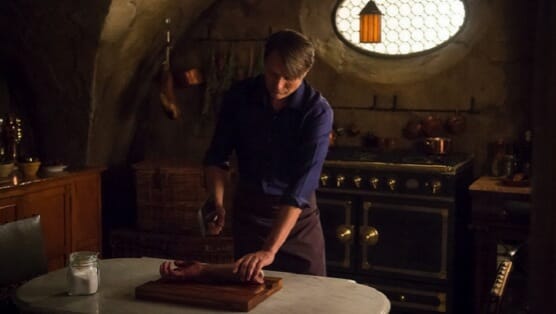Hannibal: “Secondo”
(Episode 3.03)

Last week, I touched upon how Hannibal had the audacity to go straight-up pretentious art film when it comes to its visual stylings and elliptical narrative storytelling. For the most part, this approach greatly benefits the show, as it distinguishes itself from literally everything else on TV (cable or otherwise). Unfortunately, “Secondo” may represent the show finally hitting the limit in regards to its unorthodox tendencies. That’s not to say the episode is not without its exceptional moments (that’s a given), but there are long stretches where the intense imagery feels like a cover-up for some deficiencies in the writing.
Not helping matters is the fact that the episode originally teases itself as being an exciting look into Hannibal’s childhood. Will Graham arrives at an appropriately creepy castle in Lithuania whose yard is littered with snails and fireflies. Once here, he happens upon a young Japanese woman named Chiyoh. She stands guard over a disheveled, half-crazed prisoner who looks as though he has not seen the sun in quite some time. Chiyoh claims that this is the man responsible for eating Hannibal’s sister, Mischa, thus—if Thomas Harris’ Hannibal Rising is to be taken as canon—setting the stage for the monster we know today. However, what begins as a page out of Harris’ work (Hannibal’s sister was eaten by hungry soldiers) quickly gets beautifully subverted.
During a later scene where Hannibal helps wash Bedelia, she casually comments to him, “how did your sister taste?” While the episode does not offer much in the way of clarification, it becomes abundantly clear that Fuller and his writers are not looking to replicate Harris’ vision—nor should they since that project was very much a rushed cash-grab. Here, Hannibal is presented not as a misunderstood monster with a tragic backstory; rather, he is what he always appeared to be—a deeply warped individual who has settled upon cannibalism as an appropriate means of taking down those that have wronged him. Though we have yet to learn what offense Mischa committed that resulted in her being Hannibal’s dinner, this revelation certainly helps crystallize his strange connection with Will Graham. People such as Will and Chiyoh, it seems, represent Hannibal’s attempt to replicate whatever love and affection he may have once had with Mischa. Unfortunately for Will, the only way for Hannibal to truly overcome his feelings is to eat him.
All of this no doubt sounds incredibly fascinating and, indeed, it very much is. That being said, the good material is bogged down by a lethargic pacing that feels like what would happen if Terrence Malick suddenly became obsessed with horror imagery. And that’s not nearly as awesome as it sounds. Indeed, long stretches of the episode feature detailed close-ups of snails milling about. Considering how slowly this episode appears to unfold, you can sense the obvious metaphor there.
-

-

-

-

-

-

-

-

-

-

-

-

-

-

-

-

-

-

-

-

-

-

-

-

-

-

-

-

-

-

-

-

-

-

-

-

-

-

-

-








































